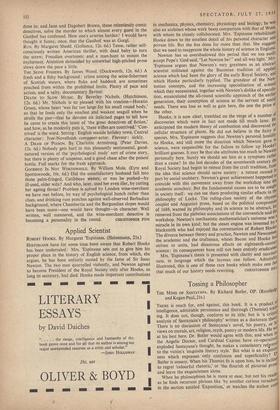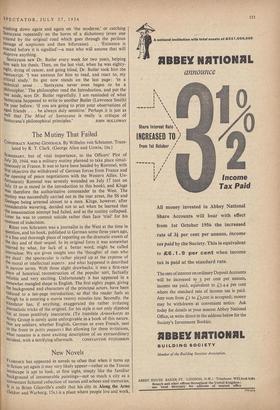Tossing a Philosopher
THE MIND OF SANTAYANA. By Richard Butler, OP. (Rout.e_ 1 dgC
and Kegan Paul, 2 Is.)
Of
THERE is much for, and against, this book. It is a product intelligence, admirable persistence and thorough (Thomist) tra.ar ing. It does not, though, conform to its title; but is 'a critical analysis of Santayana's philosophy' written as a doctorate the There is no discussion of Santayana's novel, his poetry, or 10 views on morals, art, religion, myth, poetry or modern life. He sV at his best here. Dr. Butler would agree with this; and when the Angelic Doctor, and Cardinal Cajetan have co-operativel exploded Santayana's thought, he makes a consolatory reffrea, to the victim's 'exquisite literary style.' But what is an exquisite' ness which expresses only confusion and superficiality? Butler is uneasy. When his Thomist fit is upon him, he is incline' to regret 'colourful rhetoric,' or 'the flourish of pictorial prose, and leave the exquisiteness alone. When he philosophises he is more at ease; but not his read0 as he finds recurrent phrases like 'by another curious turnabol in the section entitled 'Exposition,' or watches the author corl
crashing down again and again on 'the moderns,' or catching Santayana repeatedly on the horns of a dichotomy (even one created by the original road which goes through the perilous Passage of scepticism and then bifurcates). . . . 'Existence is enacted before it is signified'—a man who will assume that will disprove anything.
Santayana saw Dr. Butler every week for two years, helping him With his thesis. Then, on the last visit, when he was eighty- eight, dying of cancer, and going blind, Dr. Butler took him the Manuscript. 'I was anxious for him to read, and react to, my critical study.' Its gist now stands on the last page: 'in a technical sense . . . Santayana never even began to be a Philosopher.' The philosopher read the Introduction, and put the rest aside, says Dr. Butler regretfully. I am reminded of what Santayana happened to write to another Butler (Lawrence Smith) the year before: 'if you are going to print your observations of aged friends . . . be always duly sensitive.' Perhaps it is just as well that The Mind of Santayana is really 'a critique of



































 Previous page
Previous page